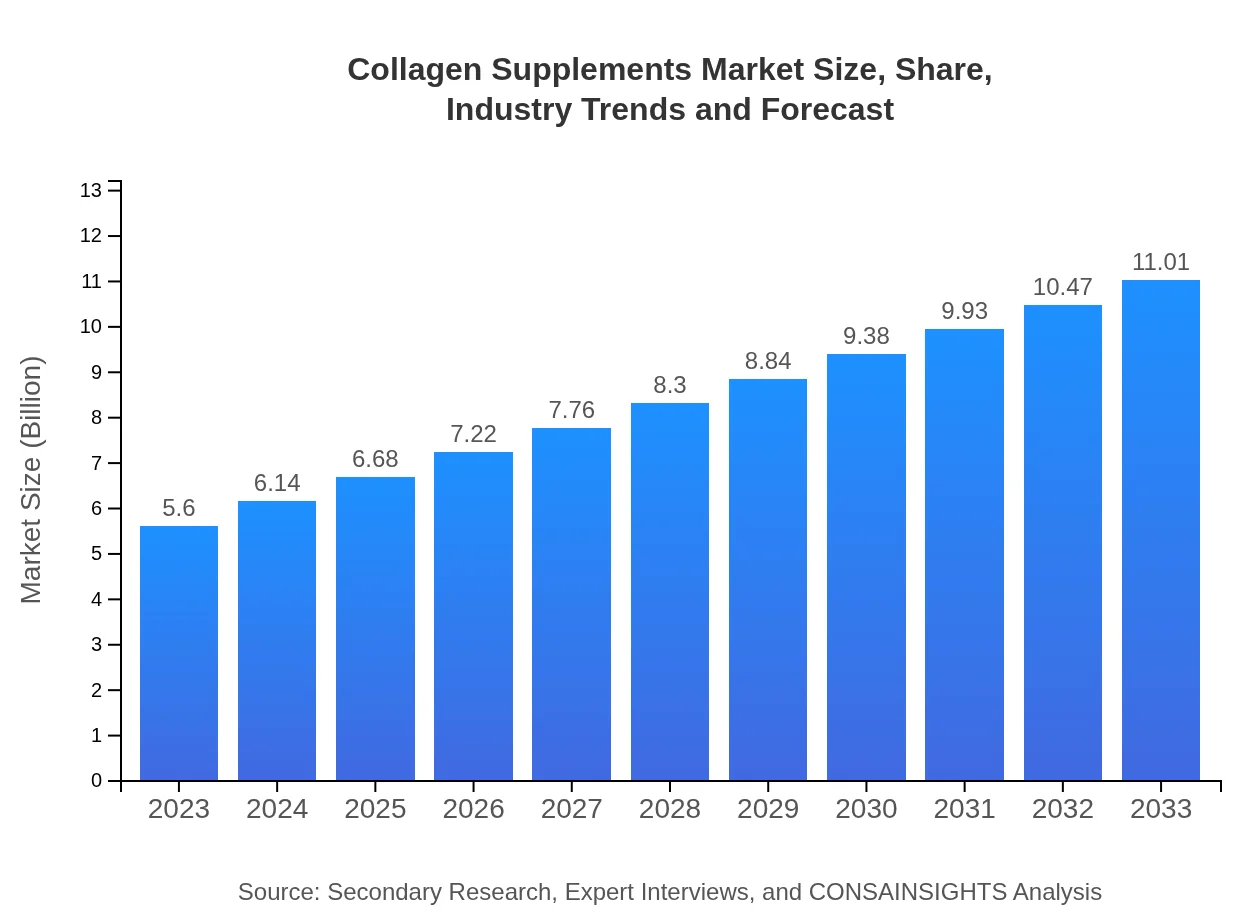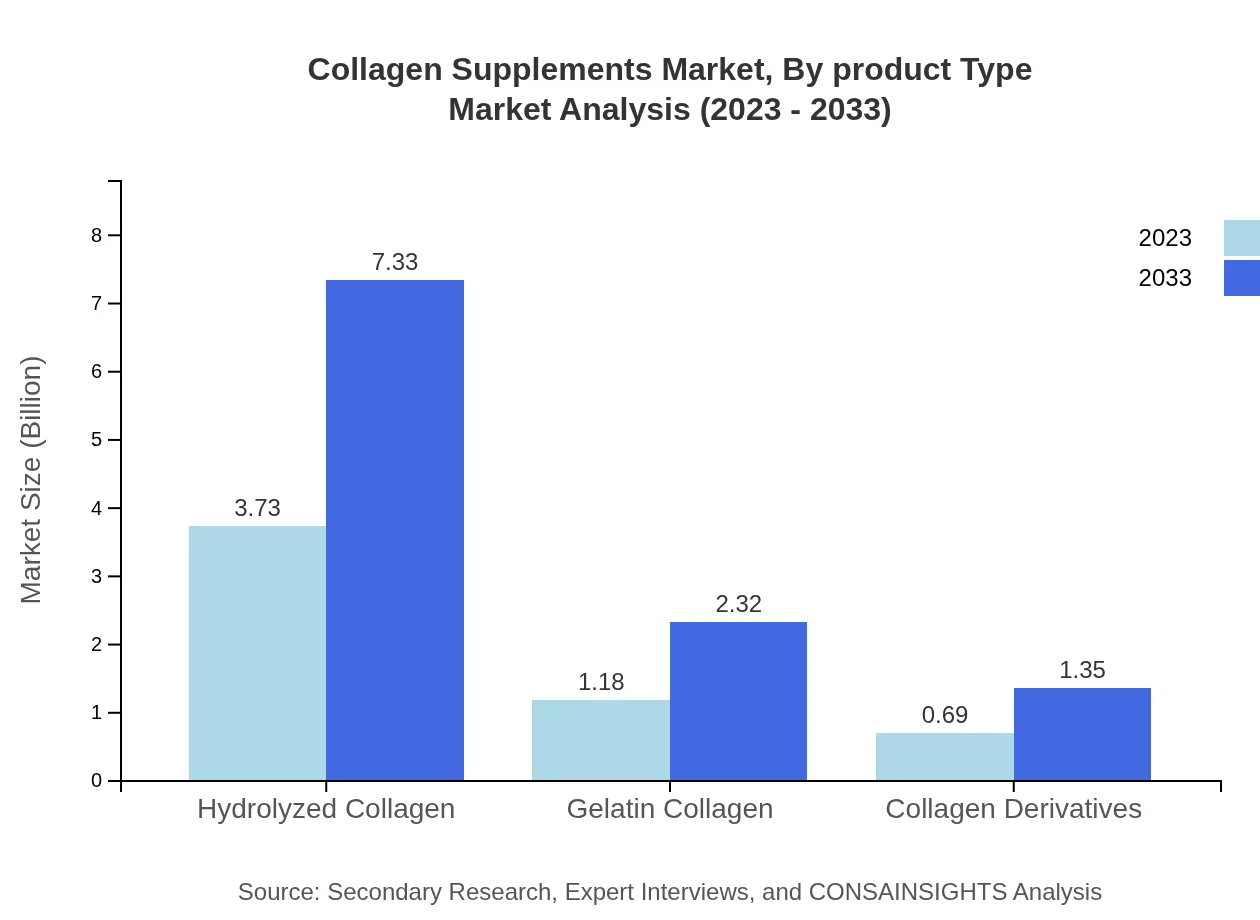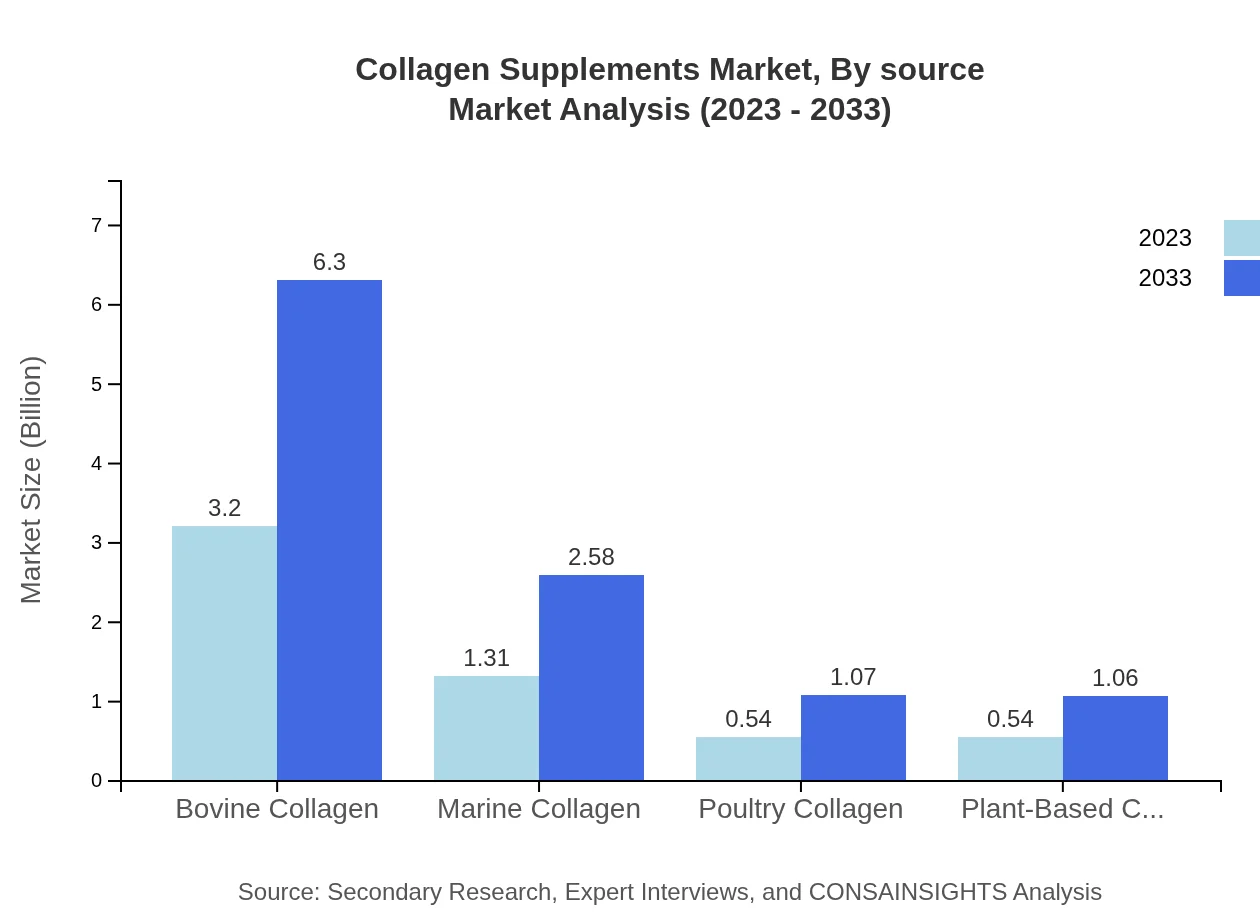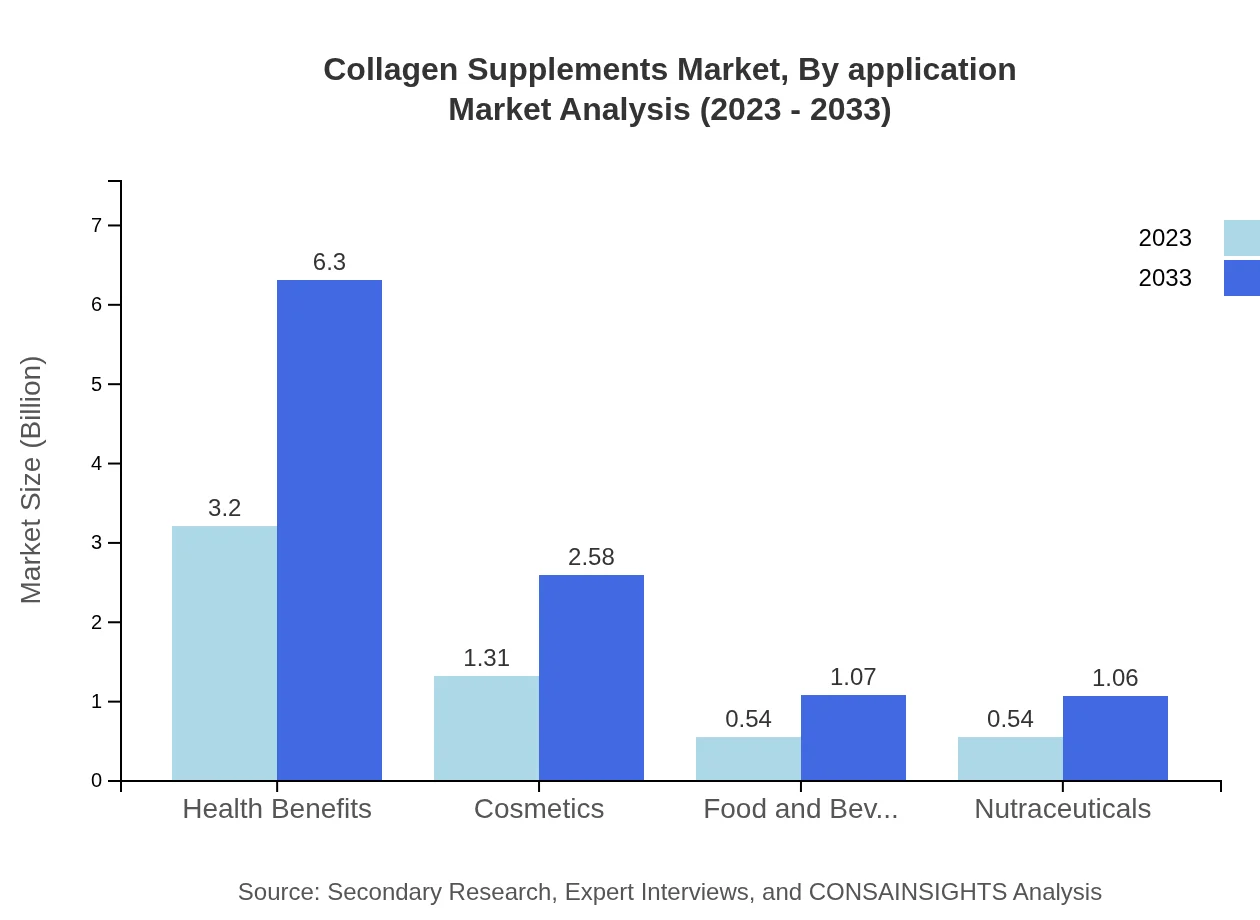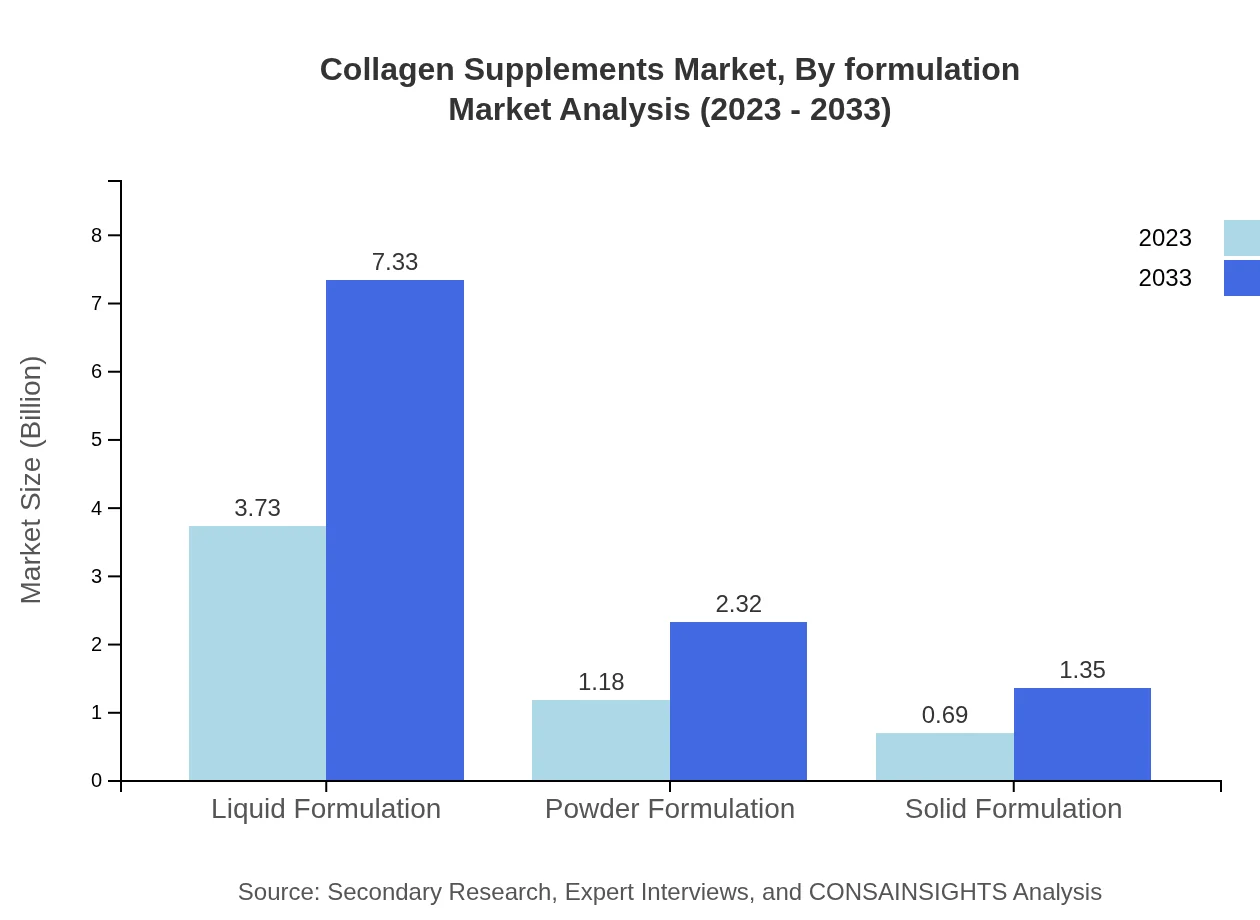Collagen Supplements Market Report
Published Date: 31 January 2026 | Report Code: collagen-supplements
Collagen Supplements Market Size, Share, Industry Trends and Forecast to 2033
This report provides an extensive analysis of the Collagen Supplements market from 2023 to 2033. It includes insights on market size, trends, segmentation, regional analysis, and forecasts to assist stakeholders in making data-driven decisions.
| Metric | Value |
|---|---|
| Study Period | 2023 - 2033 |
| 2023 Market Size | $5.60 Billion |
| CAGR (2023-2033) | 6.8% |
| 2033 Market Size | $11.01 Billion |
| Top Companies | Vital Proteins, Neocell, Collagen Solutions, Powdered Collagen |
| Last Modified Date | 31 January 2026 |
Collagen Supplements Market Overview
Customize Collagen Supplements Market Report market research report
- ✔ Get in-depth analysis of Collagen Supplements market size, growth, and forecasts.
- ✔ Understand Collagen Supplements's regional dynamics and industry-specific trends.
- ✔ Identify potential applications, end-user demand, and growth segments in Collagen Supplements
What is the Market Size & CAGR of Collagen Supplements market in 2023?
Collagen Supplements Industry Analysis
Collagen Supplements Market Segmentation and Scope
Tell us your focus area and get a customized research report.
Collagen Supplements Market Analysis Report by Region
Europe Collagen Supplements Market Report:
In Europe, the market was valued at $1.72 billion in 2023 and is anticipated to reach $3.37 billion by 2033. The region's inclination toward ethical and sustainable sourcing of collagen ingredients is driving significant interest in plant-based products.Asia Pacific Collagen Supplements Market Report:
In the Asia Pacific, the market was valued at approximately $1.00 billion in 2023 and is projected to grow to $1.97 billion by 2033. The region is experiencing increasing demand for beauty and wellness products due to rising disposable incomes and urbanization.North America Collagen Supplements Market Report:
North America has established a stronghold in the Collagen Supplements market with a value of $2.15 billion in 2023, set to grow to $4.23 billion by 2033. The trend of aging population and premiumization of health supplements significantly contribute to this growth.South America Collagen Supplements Market Report:
The South American market, valued at $0.37 billion in 2023, is estimated to reach $0.73 billion by 2033. Growing health awareness and rising consumption of functional foods are key growth drivers in this region.Middle East & Africa Collagen Supplements Market Report:
The Middle East and Africa market, valued at $0.36 billion in 2023, is expected to grow to $0.70 billion by 2033, attributed to increasing investments in personal care and dietary supplements.Tell us your focus area and get a customized research report.
Collagen Supplements Market Analysis By Product Type
The Bovine Collagen segment dominates the market, valued at $3.20 billion in 2023, with expected growth to $6.30 billion by 2033. Marine Collagen follows with $1.31 billion in 2023 and projected growth to $2.58 billion by 2033. Other segments include Poultry and Plant-Based Collagen, each showing promising growth rates indicating shifting consumer preferences.
Collagen Supplements Market Analysis By Source
Segments by source show Bovine Collagen as the largest contributor, maintaining a market share of 57.23% from 2023 to 2033. Marine Collagen comprises 23.4% of the market share, while Poultry and Plant-Based Collagen have respective shares of 9.72% and 9.65%, emphasizing the shift towards diversifying collagen sources.
Collagen Supplements Market Analysis By Application
Health Benefits applications represent a significant market segment with $3.20 billion in 2023, projected to grow to $6.30 billion by 2033. Cosmetic applications also experience robust growth, with the value anticipated to rise from $1.31 billion to $2.58 billion alongside food and nutraceutical applications reaching $1.06 billion.
Collagen Supplements Market Analysis By Formulation
Liquid formulations lead the market with a share of 66.63% in 2023, valued at $3.73 billion and expected to double to $7.33 billion by 2033. Powder formulations hold a significant market share too, expected to grow steadily while solid formulations remain a smaller part of the overall market.
Collagen Supplements Market Trends and Future Forecast
Tell us your focus area and get a customized research report.
Global Market Leaders and Top Companies in Collagen Supplements Industry
Vital Proteins:
Vital Proteins is a leading company in the collagen supplements market known for its high-quality bovine collagen products and innovative formulations that cater to health-conscious consumers.Neocell:
Neocell specializes in collagen products aimed at promoting skin health and wellness, combining traditional and modern ingredients to create effective supplement options.Collagen Solutions:
Collagen Solutions provides high-quality collagen products for various applications including pharmaceuticals, nutritional, and cosmetic products, focusing on sustainability and ethical sourcing practices.Powdered Collagen:
Powdered Collagen is known for its diverse range of collagen-based products including powders, capsules, and topical applications that target beauty and health markets.We're grateful to work with incredible clients.









FAQs
What is the market size of collagen supplements?
The global collagen supplements market is currently valued at approximately $5.6 billion and is projected to grow at a CAGR of 6.8% from 2023 to 2033, driven by increasing demand for health and cosmetic products.
What are the key market players or companies in the collagen supplements industry?
Key players in the collagen supplements industry include prominent brands specializing in dietary supplements, cosmetics, and nutraceuticals. They continuously innovate to enhance product efficacy and cater to the increasing demand for collagen-derived products.
What are the primary factors driving the growth in the collagen supplements industry?
Growth in the collagen supplements industry is primarily driven by rising consumer awareness of health benefits, increasing aging population, and the widespread acceptance of collagen in various applications, such as health products and cosmetics.
Which region is the fastest Growing in the collagen supplements market?
The fastest-growing regions in the collagen supplements market are North America and Europe, with North America projected to rise from $2.15 billion in 2023 to $4.23 billion by 2033. Europe follows, expanding from $1.72 billion to $3.37 billion in the same period.
Does ConsaInsights provide customized market report data for the collagen supplements industry?
Yes, ConsaInsights offers customized market report data tailored to the specific needs of clients within the collagen supplements industry, allowing for detailed insights and data-driven decision-making.
What deliverables can I expect from this collagen supplements market research project?
Clients can expect comprehensive deliverables from the collagen supplements market research project, including detailed market size forecasts, segment analysis, competitive landscape evaluations, and insights into regional trends affecting market dynamics.
What are the market trends of collagen supplements?
Current market trends indicate a rising preference for plant-based collagen sources, an increase in liquid formulations, and a growing focus on health benefits. The market is expected to broaden with novel innovations catering to diverse consumer needs.

